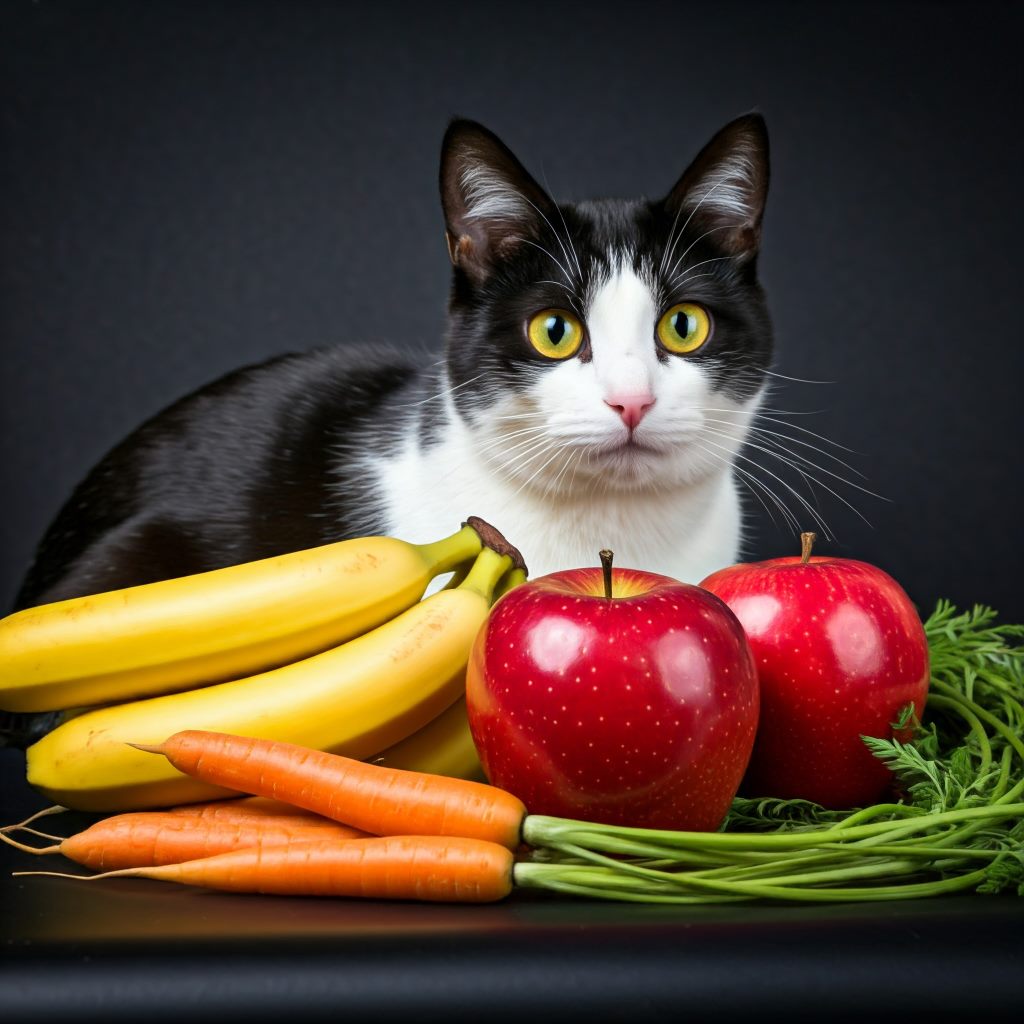
Fruits and vegetables are excellent source of vitamins, minerals, fiber and antioxidants. These nutrients support the health of your cat’s body and help prevent disease.
Cats are strict carnivores, which means they need meat to thrive. Fruits and vegetables, however, contain no meat. Although you may think that your cat can’t digest fruits and vegetables, in most cases he can eat them with no negative consequences. However, it’s important to watch out for certain foods that could be toxic for cats.
Fruits and vegetables are the best foods for cats to eat. Cats should be fed a diet that is high in protein, low in fat and carbohydrates, and contains specific vitamins and minerals.
Cats need plenty of water each day to help them stay hydrated, especially during the summer months when it can get hot outside. A good rule of thumb is one cup of water per pound of body weight daily.
Cats need to eat a variety of healthy foods in order to receive all the nutrients they need. Many people feed their cats dry food, but this can cause digestive problems like diarrhea or constipation. Cats who are fed only canned food develop health problems that can be fatal if not treated quickly.
Are Fruits and Vegetables Good for Cats?
The answer to this question is that fruits and vegetables are good for cats. Fruits and vegetables are nutritious, contain essential vitamins and minerals, and can make the cat’s diet more varied. Fruits and vegetables are also naturally low in fat, so they’re a good option for cats with obesity or diabetes.
In addition to being good for cats, fruits and vegetables are good for people as well. The nutrients found in fruits and vegetables help maintain good health, including developing a strong immune system and keeping bones strong.
Fruits and vegetables are good for cats. Fruits tend to be high in calories and low in fat, while vegetables have more fiber and vitamins than most people realize.
Fruits contain vitamin C, which is essential for maintaining a healthy immune system. It also helps the body produce collagen, which is needed for healthy skin and nails. Fruits also contain potassium, which helps maintain a healthy heart rate.
Vegetables are rich in antioxidants, which help protect cells from damage caused by free radicals. They also contain calcium, which helps build strong bones and teeth. Vegetables also contain fiber, which can help lower blood sugar levels in cats with diabetes.
Some fruits and vegetables can be dangerous to cats if they’re not prepared correctly or fed in large amounts over an extended period of time because they contain high levels of sodium (salt). Don’t feed these foods to your cat unless you’ve read the label carefully, so you know how much sodium there is in each serving size!
What Kinds of Vegetables Can Cats Eat?
Cats are carnivores, and they have very specific nutritional needs. They need meat, fish, poultry and eggs to be healthy. Vegetables can’t provide the nutrients that cats need to stay healthy. However, some vegetables don’t contain any harmful substances, so you can feed your cat these foods.
The main types of vegetables that cats can eat are:
- Alfalfa sprouts
- Carrot tops
- Chard tops
- Collards greens
- Dandelion greens
- Lettuce leaves (including romaine lettuce)
Carrots are a great source of beta-carotene, and vitamin A. Cats need Vitamin A because their eyes require it to function correctly. Beta-carotene is converted into Vitamin A by the body after being ingested. Carrots also contain fiber, which keeps your cat regular and helps them maintain a healthy weight.
Parsnips
Parsnips contain Vitamins C and K as well as fiber, which keeps your cat regular and helps them maintain a healthy weight. Parsnips also contain trace minerals such as iron, zinc, manganese and copper, which help in muscle movement as well as bone development.
Beets
Beets contain Vitamins A, B1 (thiamine), B2 (riboflavin), C and D but not E or K or Folate (folate). Beets also contain betaine which helps with the digestion process of proteins in foods like meat or fish.
What Fruit Can Cats Eat?
Cats are omnivores, meaning they can eat meat and plants. Cats have a very high concentration of vitamin C in their bodies; therefore, they can get plenty of nutrition from eating fruits and vegetables.
The main problem with feeding your cat fruit is that most of it have seeds. Cats are finicky eaters, so if you give them too much fruit at one meal, they won’t want to eat anything else.
If you don’t want to feed your cat fruit all the time, then make sure you cut up the pieces into small pieces so that your cat will be able to pick out the seeds without choking or gagging on them!
Cats can eat all kinds of meat: beef, chicken, fish, lamb and deer. They also like to eat rabbits or other small animals, such as mice.
Cats are omnivores because they can eat both plants and animals. They will hunt down prey for themselves but will also scavenge for food if there isn’t anything else around for them to catch.
Cats have a very high metabolism and don’t require a lot of calories in their diet. They can easily get enough nutrients from plants, so they don’t need a lot of protein or fat in their diet.
What Fruit Is Toxic to Cats?
Cats are not the only animals that can be poisoned by certain fruits. Certain types of berries, grapes, tomatoes and cherries are toxic to cats. According to the ASPCA, cats should not eat any type of berry or fruit that has been treated with pesticides since this will cause them to become sick and possibly die.
The most common culprit is apricots, which can cause renal failure or even death if eaten in large quantities. Other examples of potentially harmful foods include cherries, grapes and plums.
The symptoms of a cat eating a poisonous plant will be similar to the symptoms of an animal eating certain kinds of plants that are poisonous to humans. These include vomiting and diarrhoea, as well as stomach pain and cramps. A cat may also suffer from depression and anxiety.
Cats are very sensitive to the toxins in many fruits. Citrus fruits are one of the most toxic to cats. The other citrus fruits, such as kumquats, limes, and grapefruits also contain a toxic substance called citral.
The amount of toxin present in orange is so small that it would take over 150 oranges to kill a cat. The highest concentration of citral is found on the outer peel of the fruit (the white part).
Other toxic substances found in citrus fruits include limonene and linalool. These two compounds can cause respiratory problems in cats, especially if they eat large amounts of them at once.

